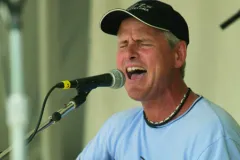Five Questions for Musician Sam Lardner

Wherever you live—and whatever your age or walk of life—there is something you can do to help the ocean, a way for you to Find Your Blue. For musician Sam Lardner, that has meant composing and producing “Blue Planet” and 13 other songs on his new CD, “Oceans Are Talking.”
The music is meant to inspire kids and adults to help save the ocean and the creatures leaving in it. Sales of the CD—featuring titles like “Humanatee,” “Pteropods,” and “Leave My Beach Alone”—help support the work of organizations fighting for the ocean.
Sam took on the project at the suggestion of a friend who works in conservation and told him about the many threats to the ocean. According to Sam's biography, the CD is “dedicated to saving the world’s ocean environments and the creatures that live there.”
On the Gulf of Mexico oil spill, Sam claims, “I don't ever want to see another oil disaster like this again, and I want to make sure that my kids and grandkids look back at these times as the moment when our generation said, ‘Enough!’"
We had a chance to ask Sam a few questions about his music and what inspired him to produce Oceans Are Talking.
1. The world is full of need. Why the ocean? Why now?
I think the needs of the world are being addressed now more than ever, and I am very inspired by the people I meet who are doing great things out there to help human beings understand our precarious situation here on earth. The reason I chose to dedicate my efforts to the oceans is because up until now we assumed that the oceans would always be OK, that these limitless waters would always be able to "clean themselves" and help absorb some of the shock we humans have inflicted upon the planet. In fact, it turns out that we need to take some pretty drastic measures to keep large parts of the oceans from becoming lifeless expanses.
2. Whom do you hope will see/hear your music? What do you want them to take away from the experience?
I want kids to listen to and enjoy this music fully. I have intentionally written the songs to be full of positive energy, hope, and inspiration. The real target audience, though, is the parents and grandparents of today's children. We, who are in position to make important changes now, must do so with the help of our kids. There simply isn't time to wait for the next generation of children to grow up and "solve" these problems. To give just one example, the bluefin tuna may be gone by the time my children are adults. UNACCEPTABLE! It is up to today's adults to save the oceans—Right now!
3. Do you have kids of your own?
Yes, I have four very wonderful children. Henry is 13, Jackson is 11, Mia is 9 and Oliver is 6.
4. Have your kids influenced or inspired you to live differently?
When Henry was in 4th grade, he did a school report on saving water. He changed the way we took showers, washed our clothes, washed our dishes, and even brushed our teeth. How cool is that? It was Jackson who first clued me in on the Great Pacific Garbage Patch. So, yes, children are powerful influencers, and that dynamic is very much behind what we are doing with "Oceans Are Talking."
5. What kind of things do you do in your household to help protect the ocean?
We have become pretty serious water freaks, from conserving it to making sure nothing toxic goes down the drain. We are moving from totally dedicated plastic recyclers to plastic "refusers." We do not use throwaway stuff anymore, and we are constantly looking for ways to make disposable plastic a thing of the past at home. Our goal is to have no plastic around to recycle! One of the biggest points to understand is that reducing our carbon footprint is hugely important to the ocean environment as well. When carbon falls into the water, ocean acidity levels rise and threaten the entire aquatic food chain. So all the little household things that make us feel greener (switching off lights, not using air conditioners, etc.) can make us feel "bluer" as well!

